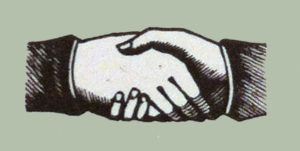Just when you thought you were rid of me, after all those Twelve Days of Christmas chapters… I am back again like a proverbial bad penny. Christmas may be over but the celebration in a way continues, just in a different light… for though we may indeed be back to our ordinary workaday world, our ancestors liked to make this transition with a little fun and ceremony. (One gathers that our ancestors were not as work-weary as we like to think; perhaps they would take pity on us with our hectic contemporary schedules.)
And so on this day after Epiphany, this first day back to ordinary time, comes St. Distaff’s Day. There are plenty of saints’ days through the year, but St. Distaff is a bit extraordinary, for there never was an historical St. Distaff. The day, rather, is named for a tool: the distaff is a tool that is part of the process of spinning wool or flax into thread, which is the first step to making cloth. When we think of spinning, we think of spinning wheels, but the distaff and spindle are earlier tools that preceded the spinning wheel. It is a tool traditionally associated with women and with women’s work, and to be sure, St. Distaff’s Day meant back to work for the women, always on this 7th of January. The men get their own back-to-work day soon enough, though, on the first Monday after Epiphany: Plough Monday, which this year will be on the 9th.
Spinning was so associated with women’s work that the word spinster, which is happily not much used these days, once was a recognized legal term in England to describe an unmarried woman, and the terms spear side and distaff side were also legal terms to distinguish the inheritances of male from female children. Any woman who spun thread (and that would have been most women in earlier times) would know the distaff well.
St. Distaff’s Day was a day for mischief: yes, the women were trying to get back to their spinning, but the men were still underfoot in the house. Their job on St. Distaff’s Day was a mischievous one, with the goal usually being to set fire to the flax the women were spinning. The women were wise to this custom, though, and typically kept several buckets of water nearby. Very often, it was the men who got the worst of it: to have a bucket of water dumped on you in the cold of January… for sure, St. Distaff’s Day lent a bit of excitement to the idea of returning to ordinary time.
There is an old saying for this Seventh of January that comes, actually, from the first two lines of a famous poem by Robert Herrick. It’s a poem from his 1648 book Hesperides, called “Saint Distaff’s Day, or the morrow after Twelfth Day.” The saying goes:
Partly worke and partly play
Ye must on St. Distaff’s Day.
This is good advice even for us today. We begin now the shift from Christmastide, which stood outside ordinary time, to our regular routines. Why not make the transition more interesting?
Give St. Distaff all the right,
Then bid Christmas sport good night;
And next morrow, every one
To his owne vocation.
Speaking of transitioning to ordinary time… your Convivio Book of Days Calendar for January is finally ready. The calendar is our monthly gift to you, a nice companion to the the blog… and sometimes it takes me a while to get around to it, and for that I apologize. It is a printable PDF on standard US letter size paper. Enjoy. (I should probably start working on February’s calendar now!)
Our illustrative image, both here and on January’s calendar, is an old lead printer’s cut of accord in a peaceful shake of hands. It’s a 19th century cut that we’ve used for the past three years in our annual Copperman’s Day prints. Come Monday, it’ll be time for another Copperman’s Day print, for Monday brings not just Plough Monday but also Copperman’s Day, an old Dutch printer’s holiday. These are all holidays signifying a return to ordinary time after Christmas and all take on this attitude of “partly worke and partly play.” More than likely I’ll be telling you about Copperman’s Day (and honoring it) come Monday. For now, though, “Give St. Distaff all the right.”
